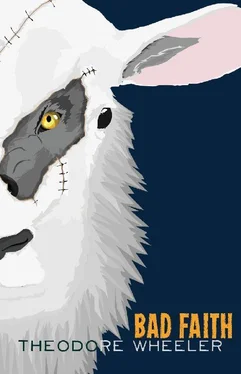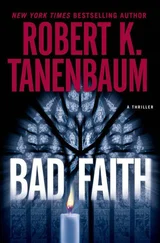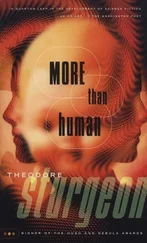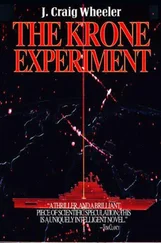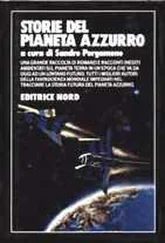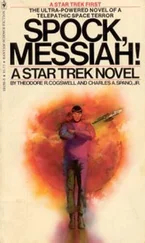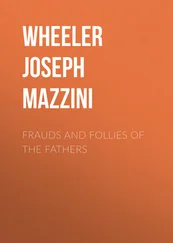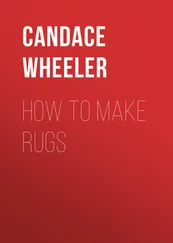He doesn’t like to talk about it, but the county Chadron comes from is one of the poorest in the nation. The Gutschows lived near the bottom of a rocky canyon, where biker gangs put up shanties to cook meth. Families like Chadron’s lived in these places too. There were wildfires there in the summer, and when brush burned, smoke became trapped between the canyon walls and saturated everything with its odor. The kids at school called Chadron Bacon Boy because he smelled like smoked meat.
Chadron was the bright spot of his family, though, because he was physically able, he could move and lift things, he’d finished high school. When he left after graduation, his family stood at the door and watched him load a few boxes and a suitcase into his Pontiac. His parents smiled on him when he turned the engine over, waved good-bye. His three younger brothers and his sister were sitting in the yard. Chadron revved the car’s motor before putting it in gear, because it always made the little ones cheer. This time was no different, even though he was moving on.
While they were dating Amy often told Chadron that she was just waiting for someone better to come along, that’s why she stayed with him. Chadron laughed when she said this, but he always kind of suspected it was true. It occurred to him a woman will latch on to someone who’s bad for her and build the guy up so that he seems better than he really is, all for the appearance that she’s doing something substantial with her life. This is why Amy agreed to marry him, Chadron figured. That when she tired of her father saying she was dating a loser, it made a twisted sort of sense that she could prove him wrong by marrying the same guy.
Being with Amy gave Chadron a sense of importance anyway. Their life wasn’t so bad then, there were plenty of good times. Chadron made steady money at the feedlot, before Amy left for Minnesota, and he didn’t drink too much.
He watches Amy survey the fields, the black perimeter of soil, the fence posts that slant out of the ground here and there. “I’d like to take a shot,” she says, “if I had a gun. I’d shoot all the time in high school, with some guys off a country road.”
“Pumpkins and stuff?”
“Melons mostly.”
As they walk down the tracks Chadron tells Amy about a dream he had a few months ago. “Don’t let it freak you out,” he warns. “It was just a nightmare.” Off in the distance, in the direction of the car, a train whistle sounds.
“You were at a nightclub in the city dancing. I wasn’t there. The bad part was that you were dancing with this woman. She didn’t look like a dyke, the both of you were just having fun, but you let her take you out to her car, and, you two made out, kind of, except, she went down on you too. Your leg kicked in the steamy back window, this lady’s face between your thighs.”
Amy looks away as Chadron explains. She takes small steps, kicks at the chalky railroad rocks, her hands in the pockets of her coat. She squints when she looks at Chadron, sucking her lips, the moonlight behind her head.
“It was like I was outside the car, watching it. I knew what was happening and it kind of made me sick. Knowing that lady and you were doing those things in the back of a car.” Chadron stops and looks at his wife, scratching into his hair. “Does that freak you out?”
“It wasn’t a dream,” she says, wincing as she shakes her head at him. “I told you about that a few months ago. You called my cell every night then. You were wasted.”
“That happened?”
Amy turns her shoulders away from Chadron and walks back toward the car. “There’s things you can’t understand. Nothing will change that.”
He follows her, trotting to catch up. There’s litter among the railroad rocks, crushed beer cans and fast-food cups, random pieces of steel. The train whistle sounds again, moving through town.
“Amy,” Chadron says, grabbing his wife by the arm. He can see her car in the distance, the train rumbling closer behind it. “You got to come home. I don’t want to sign those papers. Things are out of control, but you need to stay with me.”
Amy frees her arm and keeps walking. “I’m sorry, Chadron. You know that’s not going to happen.”
“What do you mean?” Something quivers in his stomach and he feels the tears beginning to well up. He knows that trying to stop them makes it worse.
“You, Shaddy. I’m talking about you.”
“This is my fault? You’re blaming me?”
“Come on.” She pulls him behind her by the hand. “Don’t cry.”
“You’re the one who left me. I’m the one who wants to make this work.”
“Nothing is going to change. A woman needs more than drinking Kessler and haunting Aurora. You and those boys can keep renting the house. I don’t want to live there.”
The ground beneath them shakes before the engine passes. The chug and whoosh of railcars follows. “Here she comes,” Amy yells, pointing to the engine lights. Chadron follows a few steps behind her, his face contorted red. She stops to watch the train pass, steel grinding on steel. There are farm implements on open flatbeds and inside the boxcars are tractor tires, fire hoses, bent pipes, other odds and ends, cars with smashed fenders and broken windows.
“There she goes,” Amy says. The way she looks at the train, hands clasped over her chest. Chadron doesn’t know what to think. She moves past him in the other direction.
Chadron has to jog behind her, his long legs keeping pace with her violent, choppy strides. “What are you doing?” he shouts. She runs faster, leaving him behind, easing close to a railcar until she can grab a service ladder. “I’ve got it,” she shouts, bouncing on one foot until she can pull both up. She stumbles to the flatbed from the top rung and flops to her back. Her arms spread above herself, the puffy black coat heaving. Her breath streams above her in small white clouds that wash away in the train’s draft.
“Amy,” Chadron shouts. “Wait!”
Amy sits up and looks at him running. She cups her hands around her mouth and shouts, “Jump!”
“What the fuck?” Chadron mumbles, hot all over, taking longer strides to keep up with the train. He notices a break in the path ahead, a wooden bridge that spans a creek and is just wide enough for the train.
He accelerates closer to the car, hands shaking. He reaches for her.
“No,” she says. “The ladder.”
Chadron stumbling next to the clinking railcar, his chest aching. “Jump,” she shouts again. “You can make it.”
“I can’t!”
Chadron touches the painted metal of the ladder with his fingertips. He lunges for the bottom rung but trips on the rock as he tries to pull himself up. He grasps for the handrail but can’t reach.
All he can do is watch, on his chest in the ditch, as Amy bounces away. She stands on the railcar, the moon behind her, and waves her arms in what must be half celebration, half good-bye.
Chadron has no idea where she’s headed. It bugs him, later, that neither does she.
3
It isn’t until the wind cuts through her that Amy actually considers what she’s doing. This is December after all and she’s riding north on the bed of a railcar after sunset. She nestles into her downy black coat, shoves her hands deep in its pockets, and waits for the train to pass through a town where she can jump into a grassy ditch and roll away from the rails.
She’ll have to call her father, wherever she lands, and beg him to pick her up, the way she did in college. A tall man with a dopey mustache, her father would wear gray sweatshirts and blue jeans if he came for her on a weekend, or a tweed jacket and corduroy pants if he had to take time off from work. He never asked why she needed him, but just came for her, then hummed almost happily as they returned home. “My baby girl,” he’d say, as if it were part of an old song. “What has happened to you now?”
Читать дальше
